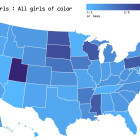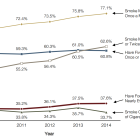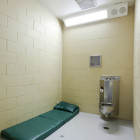
Advocates Cheer Probe of Racial Bias in Mississippi School Discipline
|
A federal investigation will examine whether discriminatory school disciplinary policies are disproportionately affecting black students in DeSoto County, Mississippi.
Juvenile Justice Information Exchange (https://jjie.org/author/sarahbarr/page/6/)

A federal investigation will examine whether discriminatory school disciplinary policies are disproportionately affecting black students in DeSoto County, Mississippi.

States should do more to protect the confidentiality of juvenile records to ensure young adults are able to access education and employment, a new report says.

More than half of Americans support closing youth prisons and redirecting the savings to community-based programs, data that gives momentum to efforts to close facilities around the country, advocates say.

“Somebody might get discovered tonight! I may have a record deal for you!” joked Georgia Rep. Erica Thomas, 28, at a communal birthday party for teenagers and young adults who are dealing with homelessness, abuse and neglect, or other troubles. Just hours before, Thomas was on the floor of the Georgia House of Representatives, where the former foster youth counts improving the lives of kids in foster care among her top priorities.

Key legislation that would strengthen protections for youth in the juvenile justice system still has a chance in the Senate.

On a Tuesday afternoon in December, Richard Walker stood on the corner outside the city’s social services building and hollered.

At a time when communities across the country are interested in evidence-based youth programming, an April conference will bring together leaders from the field to discuss what’s possible.

The latest treasure trove of data for public health researchers and policymakers who study substance use and mental health arrived this week, with findings that suggest behavioral health among U.S. teenagers is improving by some measures.

WASHINGTON — A new ban on solitary confinement for juveniles in federal prison could bring momentum to reform efforts on the state level.

When officials in four states were asked several years ago what tools they would need to divert youth from the juvenile justice system, a better understanding of trauma was at the top of all their lists.